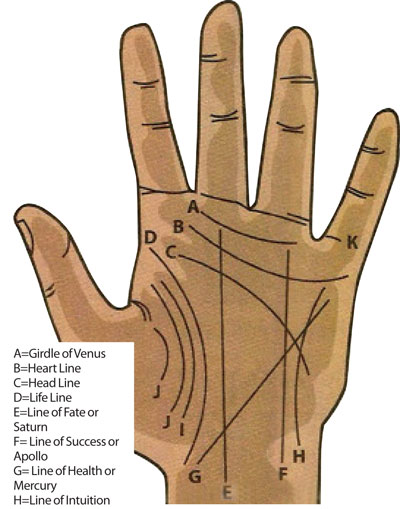24 Mar 2017 - {{hitsCtrl.values.hits}}
By A.S. Fernando
The human hand is a marvellous creation of nature, say anthropologists. Not without reason, for its adaptation to the requirements of life marks the beginning of human civilization.
The hand is the direct servant of the brain. Markings on the hand reveal not only the workings of the brain, but also the general characteristics, mental peculiarities, capabilities and feelings of its owner. Above all, these markings signify what is in store for him in the future, say expert palmists.
Palmistry is the art of telling the characteristics of a person and important happenings in his life by examining the lines and other marks on the palm.

To the trained reader, the hand reveals not only the character, talents and proclivities of the subject but also the health, sickness, and important incidents in his life and also the most suitable career to be followed by him, says the celebrated writer on palmistry who goes by the pseudonym Psychos’, in his work, The new Guide to Palmistry’.
Palmistry, according to Psychos is divided into two parts, namely Chirognomy or the science of judging the character from the shape of the hand and the fingers and Chiromancy, the science of reading the actions and habits of the past, present and the future events from the formation of the palm and the lines marked on it.
Hindu palmists treat palmistry as a branch of Astrology. As regards the other branches of Astrology, the date and time of the birth is vital for making a correct prediction. But in the case of palmistry, the date and time of birth of a person is not very important because his past, the present and the future lie hidden in the lines and marks on his hand.
Palmistry has also made a great contribution towards the development of medical science in regard to diagnosis of disease. Because a disease person is afflicted with could be quickly and easily determined by observing the texture, lines and marks on his palm whereas it would take a day or two for a physician to ascertain the cause of a disease with the aid of medical equipment.
The science of palmistry is said to have been greatly developed in India in ancient times. Sages in ancient India, it is said, were able to give a reading covering very minute of the life of a person by examining the lines and marks on his palm.
Expert palmists say that one should not base one’s reading on one particular main line in isolation, because the prediction could go wrong without a study of other lines complementary to the main line.
An expert palmist would not overlook any line be it very tiny or barely discernible because he knows even the tiniest line would tell a story.
Expert palmists would place special emphasis on the right hand, because it is the right hand people mostly work with. If a person uses his left hand for writing purposes and to perform other manual functions, the left palm should be given more importance.
The left hand of women dependent on their husbands or parents assumes more significance than the right one. However, in the case of women who earn their living by using their brain or brawn, their right hand should be considered more important than the left one.
22 Nov 2024 22 Nov 2024
22 Nov 2024 22 Nov 2024
22 Nov 2024 22 Nov 2024
22 Nov 2024 22 Nov 2024
22 Nov 2024 22 Nov 2024